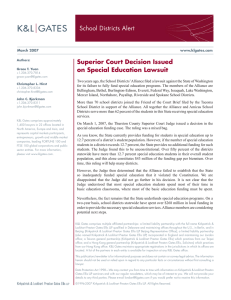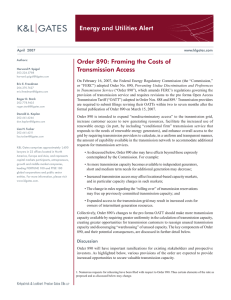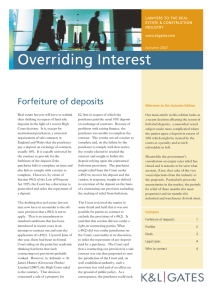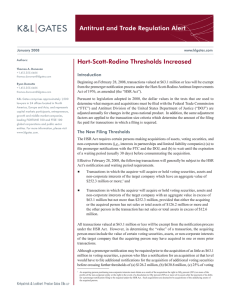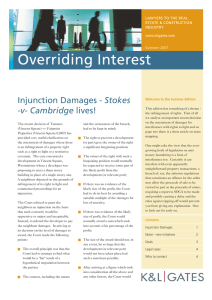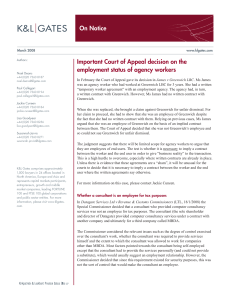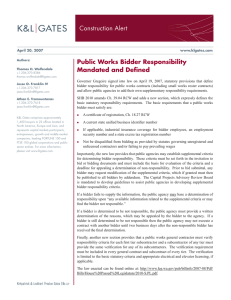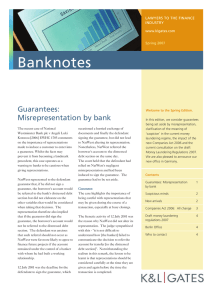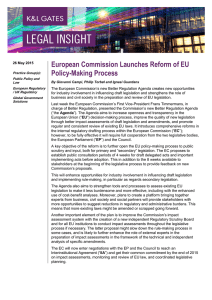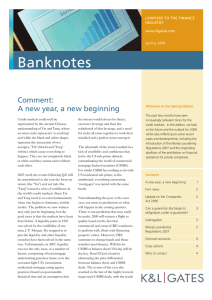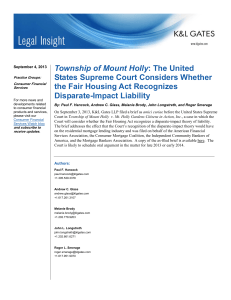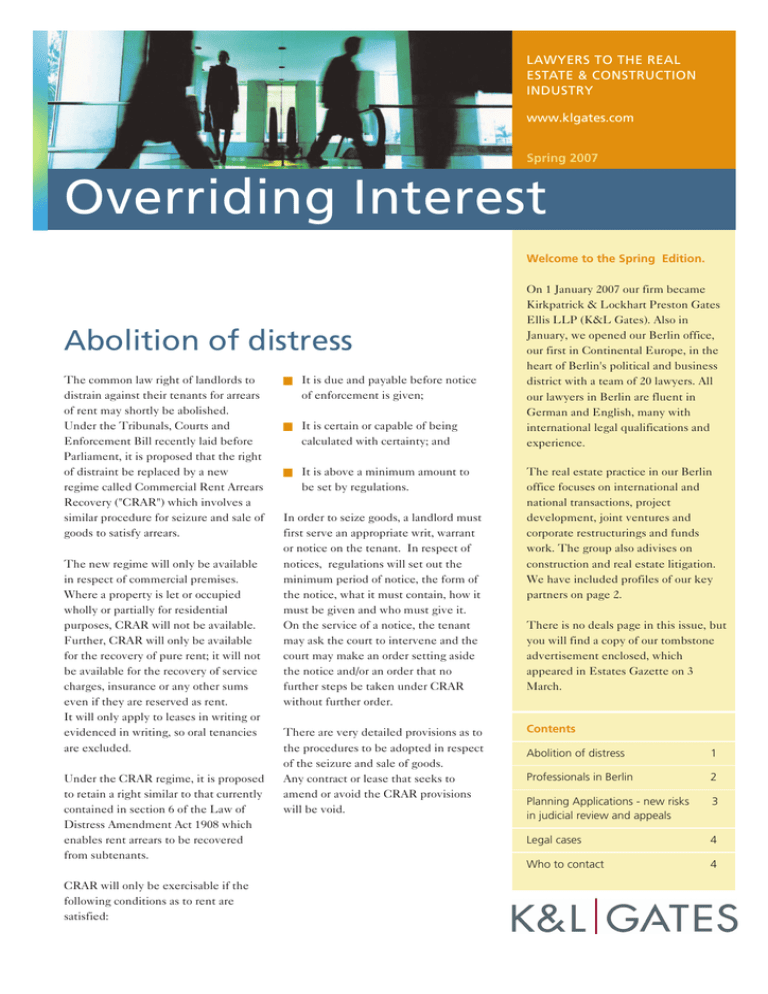
LAWYERS TO THE REAL
ESTATE & CONSTRUCTION
INDUSTRY
www.klgates.com
Spring 2007
Overriding Interest
Welcome to the Spring Edition.
Abolition of distress
The common law right of landlords to
distrain against their tenants for arrears
of rent may shortly be abolished.
Under the Tribunals, Courts and
Enforcement Bill recently laid before
Parliament, it is proposed that the right
of distraint be replaced by a new
regime called Commercial Rent Arrears
Recovery ("CRAR") which involves a
similar procedure for seizure and sale of
goods to satisfy arrears.
The new regime will only be available
in respect of commercial premises.
Where a property is let or occupied
wholly or partially for residential
purposes, CRAR will not be available.
Further, CRAR will only be available
for the recovery of pure rent; it will not
be available for the recovery of service
charges, insurance or any other sums
even if they are reserved as rent.
It will only apply to leases in writing or
evidenced in writing, so oral tenancies
are excluded.
Under the CRAR regime, it is proposed
to retain a right similar to that currently
contained in section 6 of the Law of
Distress Amendment Act 1908 which
enables rent arrears to be recovered
from subtenants.
CRAR will only be exercisable if the
following conditions as to rent are
satisfied:
It is due and payable before notice
of enforcement is given;
It is certain or capable of being
calculated with certainty; and
It is above a minimum amount to
be set by regulations.
In order to seize goods, a landlord must
first serve an appropriate writ, warrant
or notice on the tenant. In respect of
notices, regulations will set out the
minimum period of notice, the form of
the notice, what it must contain, how it
must be given and who must give it.
On the service of a notice, the tenant
may ask the court to intervene and the
court may make an order setting aside
the notice and/or an order that no
further steps be taken under CRAR
without further order.
There are very detailed provisions as to
the procedures to be adopted in respect
of the seizure and sale of goods.
Any contract or lease that seeks to
amend or avoid the CRAR provisions
will be void.
On 1 January 2007 our firm became
Kirkpatrick & Lockhart Preston Gates
Ellis LLP (K&L Gates). Also in
January, we opened our Berlin office,
our first in Continental Europe, in the
heart of Berlin's political and business
district with a team of 20 lawyers. All
our lawyers in Berlin are fluent in
German and English, many with
international legal qualifications and
experience.
The real estate practice in our Berlin
office focuses on international and
national transactions, project
development, joint ventures and
corporate restructurings and funds
work. The group also adivises on
construction and real estate litigation.
We have included profiles of our key
partners on page 2.
There is no deals page in this issue, but
you will find a copy of our tombstone
advertisement enclosed, which
appeared in Estates Gazette on 3
March.
Contents
Abolition of distress
1
Professionals in Berlin
2
Planning Applications - new risks
in judicial review and appeals
3
Legal cases
4
Who to contact
4
Overriding Interest
Meet our professionals in Berlin
Felix Greuner, Partner
+49 (0)30 220 029 100
felix.greuner@klgates.com
Felix practises in the real estate and
construction areas. He is experienced
in advising on all aspects of real estate
transactions and development projects
as well as private and public
construction law.
Dr. Georg Foerstner, Partner
+49 (0)30 220 029 120
georg.foerstner@klgates.com
Georg Foerstner is a partner in the real
estate practice group. He focuses his
practice on real estate transactions
including all aspects of development
projects, dispute resolution, and
litigation. His experience includes
landlord and tenant matters and
insolvency law.
Christoph Wagner, Partner
+49 (0)30 220 029 110
christoph.wagner@klgates.com
Christoph focuses his practice on real
estate and commercial litigation. He is
also a public notary. He has extensive
experience in advising leading German
and international real estate investors
on real estate investments. He has
litigated a variety of complex
commercial disputes including
banking and product liability matters.
He has acted in arbitration and
represented clients in alternative
dispute resolution forums.
2
SPRING 2007
Dr. Christian Hullmann, Partner
+49 (0)30 220 029 140
christian.hullmann@klgates.com
Christian Hullmann focuses his
practice on real estate law. He has
extensive experience in advising
leading German and international
corporate clients on real estate
transactions, planning law and landlord
and tenant law.
Christoph Mank, Partner
+49 (0)30 220 029 130
christoph.mank@klgates.com
Christoph practises in the real estate
area. He is experienced in advising on
construction and engineering dispute
management and landlord and tenant
matters. He also advises a broad range
of clients including large corporations,
smaller construction companies, closed
funds, property companies and private
investors.
www.klng.com
Planning Applications - new risks in judicial
review and appeals
On 10 August 2006 Section 327A of
The Town & Country Planning Act
1990 crept very quietly into force in
England. The effect of the new
section is that any non-compliance with
"the form or manner in which an
application is made" or the "form or
content" of any document
accompanying an application will put
the application beyond the power of
the local authority to "entertain".
These requirements as to form are
expressed in absolute terms, and the
traditional approach that some degree
of flexibility can be allowed is now
unlikely to be taken by a court called
upon to interpret the new section. As a
result any departure from the formal
requirements set out either by the local
planning authority in its published
form, or under The Town & Country
Planning (Applications) Regulations
1988 could render an application
invalid, and hence any planning
permission purported to be granted
pursuant to such application.
The requirement is that a local
planning authority must not "entertain"
the application which contains errors,
so the new section opens the door to a
new range of third party judicial review
challenges on the basis of a decision if
planning permission is issued despite
non-compliance of the application.
The difficulty raised by the new
provision for applicants and consultants
is soon to be compounded as a new
batch of forms, known as application
form 1APP is to be rolled out by the
DCLG between now and October
2007. As the development industry is
confronted with new and unfamiliar
forms, there is a greater risk of errors.
This will result in a new threat of
judicial review applications from third
parties and a new line of argument at
appeals. Also an 'automatic win' for
Councils facing appeals against nondetermination must always be borne in
mind and the first steps towards
planning permission now carry a greater
degree of long term risk.
The most common errors likely to be
caught by the new section are related
to the certification of property
ownership. These are often filled in
with only casual regard to checking the
redline plan against title records and
review of leasehold interests. Some
additional front-loading of the process
is now prudent: our recommendation is
title should be checked and redline
plans and Part II Certificates given
legal sign-off before applications are
lodged.
SPRING 2007
3
Overriding Interest
www.klng.com
Legal cases
Easements
Right to Light
Rent Act Tenancies
In a case where a right of way was
obstructed but the party with the
benefit of the right did not bring
proceedings for three years, the Court
said that, nevertheless, in the
circumstances it was not inequitable or
oppressive to grant an injunction for
the removal of the obstruction.
In assessing damages for an
infringement of a right to light, the
Court said that it would seek to find
the "fair" result of a hypothetical
negotiation and, in doing so, would
have reference to the likely
development profit.
A tenancy granted for mixed residential
and commercial use which at the time
of its grant was protected by the
Landlord and Tenant Act 1954 was said
not to have fallen within the Rent Act
1977 when the commercial use ceased.
Comment: The tests set out in the
historic case of Shelfer -v- London
Electric Lighting Co (1895) were
applied.
Comment: A one-third split of profit
was taken as the starting point.
Tamares (Vincent Square) -v- Fairpoint
Properties, ChD
Comment: There was no letting of a
"separate dwelling" as was required for
the 1977 Act to apply.
Tan -v- Sitkowski, CA
Break Clause
Jacklin -v- West Yorkshire Chief
Constable, CA
Boundary Dispute
A landowner proved that his
predecessors had rebuilt a disputed
boundary wall, inserted a dpc and
incorporated the wall into a new
carport. It was held that there was
sufficient evidence to establish adverse
possession of the wall.
Comment: The landowner's
subsequent request for permission in
respect of the wall from the neighbour
did not change the position.
Options
An option agreement provided for its
extension on service by the option
holder of a notice within a stated period
and on the payment of a fixed sum. It
was held that a letter sent by the option
holder referring only to the funding of
the payment satisfied the notice
requirement.
Comment: The "reasonable recipient"
test set out in Mannai Investment
Co -v- Eagle Star Assurance (1997) was
applied.
Rennie -v- Westbury Homes, ChD
A lease contained a tenant's break
clause conditional upon the provision
of vacant possession. Prior to the break
date, the landlord and tenant agreed a
compromise regarding dilapidations.
The tenant failed to vacate but the
Court held that the compromise had
waived the vacant possession
requirement.
Comment: The landlord's remedies
were said to be limited to damages for
the trespass.
Legal and General Assurance Society
-v- Expeditors International, CA
Palfrey -v- Wilson, CA
K&L Gates
Who to Contact
110 Cannon Street
For further information contact
Steven Cox
steven.cox@klgates.com
T: +44 (0)20 7360 8213
Milton McIntosh
milton.mcintosh@klgates.com T: +44 (0)20 7360 8259
Susan Henning
susan.henning@klgates.com
T: +44 (0)20 7360 8236
London EC4N 6AR
www.klgates.com
T: +44 (0)20 7648 9000
F: +44 (0)20 7648 9001
K&L Gates comprises approximately 1,400 lawyers in 22 offices located in North America, Europe and Asia, and represents capital markets participants, entrepreneurs, growth and middle
market companies, leading FORTUNE 100 and FTSE 100 global corporations and public sector entities. For more information, please visit www.klgates.com.
K&L Gates comprises multiple affiliated partnerships: a limited liability partnership with the full name Kirkpatrick & Lockhart Preston Gates Ellis LLP qualified in Delaware and maintaining offices
throughout the U.S., in Berlin, and in Beijing (Kirkpatrick & Lockhart Preston Gates Ellis LLP Beijing Representative Office); a limited liability partnership (also named Kirkpatrick & Lockhart Preston
Gates Ellis LLP) incorporated in England and maintaining our London office; a Taiwan general partnership (Kirkpatrick & Lockhart Preston Gates Ellis) which practices from our Taipei office; and a
Hong Kong general partnership (Kirkpatrick & Lockhart Preston Gates Ellis, Solicitors) which practices from our Hong Kong office. K&L Gates maintains appropriate registrations in the
jurisdictions in which its offices are located. A list of the partners in each entity is available for inspection at any K&L Gates office.
This publication/newsletter is for informational purposes and does not contain or convey legal advice. The information herein should not be used or relied upon in regard to any particular facts
or circumstances without first consulting a lawyer.
Data Protection Act 1998 - We may contact you from time to time with information on Kirkpatrick & Lockhart Preston Gates Ellis LLP seminars and with our regular newsletters, which may be of
interest to you. We will not provide your details to any third parties. Please e-mail london@klgates.com if you would prefer not to receive this information.
4
SPRING 2007
©1996-2007 Kirkpatrick & Lockhart Preston Gates Ellis LLP. All Rights Reserved.


